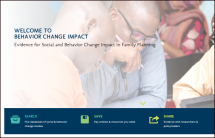Behavior Change Impact
Research consistently shows evidence-based social and behavior change (SBC) programs can increase knowledge, shift attitudes and norms and produce changes in a wide variety of behaviors. SBC has proven effective in several health areas, such as increasing the uptake of family planning methods, condom use for HIV prevention, and care-seeking for malaria.
Between 2017 and 2019, a series of comprehensive literature reviews were conducted to consolidate evidence that shows the positive impact of social and behavior change (SBC) interventions on behavioral outcomes related to family planning, HIV, malaria, reproductive empowerment, and the reproductive health of urban youth in low- and middle-income countries.
The result is five health area-specific databases that support evidence-based SBC. The databases are searchable by keyword, country, study design, intervention and behavior. The databases extract intervention details, research methodologies and results to facilitate searching. For each of the five health areas, a “Featured Evidence” section highlights a list of key articles demonstrating impact.
These databases, as well as accompanying reports, briefs, factsheets, and infographics provide program planners, implementers and policy-makers with the evidence they need to make the case for the value of SBC and to strengthen the impact of their SBC efforts. They can also support program designers to understand what SBC approaches have worked and consider how programs might be adapted to their context. These databases and some additional content found on this website were originally developed by the Health Communication Capacity Collaborative (HC3), a five-year, global project funded by USAID from 2012 to 2017 that strengthened developing country capacity to implement state-of-the-art social and behavior change communication (SBCC) programs.
Last modified: December 8, 2020
Language: English

